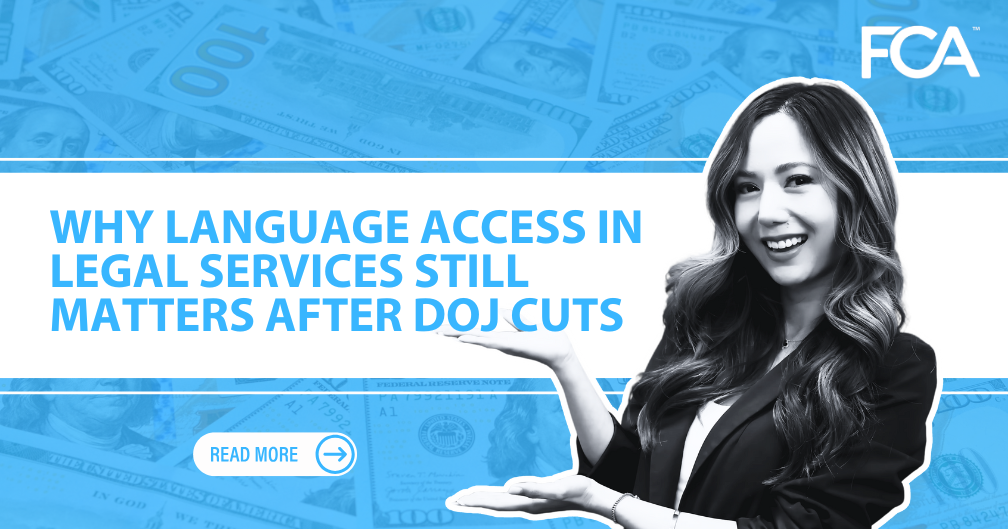On July 14, 2025, the U.S. Department of Justice issued new guidance under Executive Order 14224, mandating the minimization of “non-essential” multilingual services across federal agencies. Framed as an efficiency measure, the policy marks a historic rollback of language access protections—particularly impacting Limited English Proficient (LEP) individuals, many of whom are personal injury plaintiffs in states like California.
This shift has sparked growing concerns among legal professionals and advocacy groups who worry that these cuts will disproportionately harm Spanish-speaking individuals seeking justice after accidents, injuries, or workplace harm.
From Language Access to Legal Inaccessibility
The DOJ’s memorandum supports English-only government services and encourages the use of AI translation tools in lieu of human interpreters. It also dismantles key provisions of Executive Order 13166, which had long provided guidance to ensure LEP individuals could access federally funded services.
While AI translation may work in casual or low-stakes scenarios, it lacks the nuance, accuracy, and cultural sensitivity needed in legal contexts. Misinterpretation of a medical term or legal clause could mean the difference between winning a case—or walking away with nothing.
For plaintiffs navigating personal injury claims, language is not just a communication tool—it’s a lifeline.
California: A High-Risk Zone for Language Disenfranchisement
California is home to one of the largest Spanish-speaking populations in the U.S., with nearly half of its residents speaking a language other than English at home. Many of these individuals are working-class, immigrants, or low-income earners—making them more likely to face hazards like car crashes, on-the-job injuries, or unsafe housing.
When these individuals suffer injuries and need legal help, they now face an added barrier: limited or no access to essential documents, explanations, or court proceedings in a language they understand.
The Role of Legal Funding in a Post-Language Access World
In this new legal environment, third-party legal funding companies are stepping in to support LEP plaintiffs—not just financially, but also linguistically.
Here’s how they help:
- Bilingual Support Teams: Some legal funding providers employ bilingual professionals who assist plaintiffs in understanding their legal rights, timelines, and financial options.
- Translation of Key Documents: From police reports to medical records, translated materials help non-English speakers stay informed and empowered throughout their case.
- Support for Law Firms: Legal funding companies also collaborate with law firms to facilitate access to interpreters and translators, helping ensure plaintiffs’ cases are built on clarity, not confusion.
This kind of support is critical as government agencies begin phasing out traditional language access infrastructure.
Why Machine Translation Can’t Replace Human Advocacy
AI-powered translation tools are faster and cheaper, but they fall short when precision is paramount. Legal documents often contain specialized terminology that can’t be easily translated word-for-word. In personal injury cases, where medical diagnoses, legal rights, and financial agreements are involved, accuracy matters.
LEP plaintiffs are at risk of misunderstanding case developments, missing deadlines, or signing unfavorable settlements without fully knowing their rights. Human interpreters and professional translators provide the accountability and cultural understanding that AI lacks.
Language Should Not Be a Barrier to Justice
While federal agencies move to reduce multilingual services, the need for inclusive legal support is only growing. Plaintiffs who have already suffered physical harm shouldn’t have to fight through additional layers of confusion, miscommunication, or silence to get the help they need.
In states like California, where diversity is a strength, private sector solutions—like legal funding and interpretation support—are stepping up where public services are falling short.
What You Should Know
If you’re involved in a personal injury case and struggle with English, you’re not alone—and you’re not without options. Legal funding companies in California are helping Spanish-speaking plaintiffs bridge the gap, access the financial help they need, and stay fully informed throughout the legal process.
Justice should be accessible to everyone—regardless of language.
Who is Fund Capital America?
Since 2006, Fund Capital America (FCA) has been a trusted leader in pre-settlement funding, providing cash advance loans to plaintiffs in personal injury and accident cases. Over the years, FCA has proudly served thousands of law firms and tens of thousands of clients, helping them navigate the financial challenges of litigation. While our core service is pre-settlement funding, we also offer a comprehensive range of services to support law firms and their clients from the beginning of the case to the final settlement check distribution.
Fund Capital America’s Services
In addition to pre-settlement funding, FCA provides a broad array of services designed to alleviate the financial and administrative burdens on injury victims, law firms, and medical professionals. Our services include:
- Pre Settlement Funding
- Policy Limits
- Doctor & Medical Facility Directory
- Doctor & Medical Facility Scheduling
- Language Services
- Investigation Services
- Medical Legal Finance
- Surgery Funding
- Medical Lien Funding
- Law Firm Funding & Law Firm Banking Services
- Law Firm Line of Credit
- Medical Receivables Financing
- Law Firm Services
Get the Legal Funding Support You Need in Just 5 Minutes!
Here’s how it works:
Fill out our application form: It takes just 5 minutes to provide the necessary details about your case.
Get prequalified: Our team will review your application and get back to you swiftly, often within hours.
Need assistance? Call us at the number provided for immediate support from our knowledgeable staff.
Don’t let financial stress prevent you from focusing on your recovery. Apply now to secure your lawsuit cash advance!



